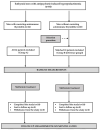Autoimmune Thyroiditis Mitigates the Effect of Metformin on Plasma Prolactin Concentration in Men with Drug-Induced Hyperprolactinemia
- PMID: 39204081
- PMCID: PMC11357093
- DOI: 10.3390/ph17080976
Autoimmune Thyroiditis Mitigates the Effect of Metformin on Plasma Prolactin Concentration in Men with Drug-Induced Hyperprolactinemia
Abstract
Metformin inhibits the secretory function of overactive anterior pituitary cells, including lactotropes. In women of childbearing age, this effect was absent if they had coexisting autoimmune (Hashimoto) thyroiditis. The current study was aimed at investigating whether autoimmune thyroiditis modulates the impact of metformin on the plasma prolactin concentration in men. This prospective cohort study included two groups of middle-aged or elderly men with drug-induced hyperprolactinemia, namely subjects with concomitant Hashimoto thyroiditis (group A) and subjects with normal thyroid function (group B), who were matched for baseline prolactin concentration and insulin sensitivity. Titers of thyroid peroxidase and thyroglobulin antibodies, levels of C-reactive protein, markers of glucose homeostasis, concentrations of pituitary hormones (prolactin, thyrotropin, gonadotropins, and adrenocorticotropic hormone), free thyroxine, free triiodothyronine, testosterone, and insulin growth factor-1 were measured before and six months after treatment with metformin. Both study groups differed in titers of both antibodies and concentrations of C-reactive protein. The drug reduced the total and monomeric prolactin concentration only in group B, and the impact on prolactin correlated with the improvement in insulin sensitivity and systemic inflammation. There were no differences between the follow-up and baseline levels of the remaining hormones. The results allow us to conclude that autoimmune thyroiditis mitigates the impact of metformin on prolactin secretion in men.
Keywords: autoimmune thyroid disease; insulin sensitivity; lactotropes; men; prolactin excess.
Conflict of interest statement
The authors declare no conflicts of interest.
Figures
References
-
- Cappelli C., Rotondi M., Pirola I., Agosti B., Gandossi E., Valentini U., De Martino E., Cimino A., Chiovato L., Agabiti-Rosei E., et al. TSH-lowering effect of metformin in type 2 diabetic patients: Differences between euthyroid, untreated hypothyroid, and euthyroid on L-T4 therapy patients. Diabetes Care. 2009;32:1589–1590. doi: 10.2337/dc09-0273. - DOI - PMC - PubMed
LinkOut - more resources
Full Text Sources
Research Materials


